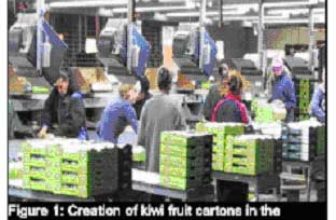
ERP and RFID application in food safety
[ad_1]
RFID technology guarantees food safety
Under such severe circumstances, food safety monitoring is particularly important. With the continuous development of automation technology, RFID has become the most effective means to ensure the safety of food and agricultural products. Food manufacturers at home and abroad have also applied this technology to supply chain management.
The milk powder produced by the famous German milk powder manufacturer Berchtgadner Nutritional Food Factory has not had any safety problems in 60 years, which depends on the use of all its infant formula milk powders.electronic labelFull chip management.
Hong Kong’s “RFID-based Shenzhen-Hong Kong Integrated Food Safety Supply Chain Public Information Platform” allows citizens to understand the source of fresh and live products such as vegetables and live pigs for Hong Kong through electronic tags, and to eat safe vegetables and pork.
The food information safety management and monitoring system involves all aspects of food production, processing, storage, transportation, sales, etc., with large amounts of data, complex links, and technical requirements. However, the supervision of the ERP management system is more secure. RFID and ERP Double pipes under it, to ensure food safety and worry-free.
The core purpose of the ERP system is to achieve effective management of the entire supply chain, which can help food companies achieve scientific and accurate data, realize information sharing, and establish electronic files, carry out all-weather credit tracking of the supply chain, and trace the source to find key problems. . On this basis, RFID technology is integrated to conduct comprehensive and effective supervision from distributors to retailers, shopping malls, and end consumers.RFIDTo achieve better controllable, traceable, and traceable food safety, especially with the continuous improvement of RFID technology, it will maximize the people’s trust in food safety.
ERP integrates RFID, double insurance is also difficult
1. High-cost SMEs stay away
For domestic food companies,RFIDAnd the cost of ERP system is also an important issue hindering its promotion. There are a large number of agricultural and sideline products, and the price of agricultural and sideline products is high. Although the cost of RFID has dropped a lot, it is still relatively high compared to agricultural and sideline products. Therefore, this is one of the reasons why many manufacturers are unwilling to use RFID. In addition, ERP The system price ranges from hundreds of thousands to millions of yuan, which discourages small and medium-sized enterprises.
2. Inadequate food logistics information management
The development of food logistics informatization in China is not fast, and there is a lack of unified standards and supervision systems. On the other hand, food logistics belongs to multi-layer management, which makes the food logistics market decentralized and makes supervision more difficult. Food logistics informatization, especially ERP promotion based on security information management is more difficult to implement.
3. Data security and privacy are difficult to guarantee
Data security and privacy protection are also issues that need to be resolved in applications. In the application, it is particularly necessary to prevent illegal reading and writing and tampering of the content of the RFID tag, to ensure the safety and accuracy of the RFID tag data, and to protect the privacy of the manufacturer’s operating data. While ERP is built on the internal system of the enterprise, it is relatively unnecessary to worry too much about data security.
All parties collaborate to promote the marketization of RFID
Although there are still many challenges in the application of ERP and RFID technologies in food safety, they still need to be improved and improved, but they are ultimately only tools. The most important thing in this link is the cooperation between supply chain personnel, only technology and control Only by working together can we achieve standards and systems.
The government should also play its due role, give enterprises appropriate support and subsidies, and promote the reduction of RFID costs in the short term and enter the stage of spontaneous market operation. I believe that in today’s high enthusiasm for the development of the Internet of Things, we do not want to see related technologies being shelved because of the high cost, and even more do not want to see that the “Internet of Things” is just thunder and rain. Only when it is integrated into the lives of the people. It is a society that truly realizes informatization and intelligence.
[ad_2]




